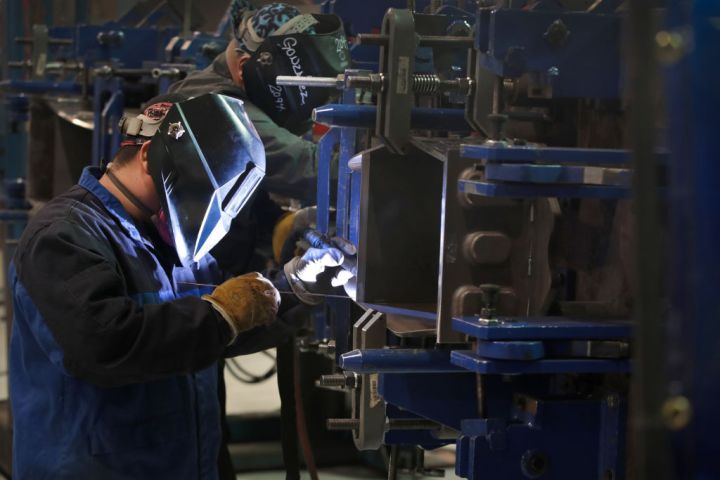
Despite tariffs and rising costs, the steel industry might also have pricing power
Despite tariffs and rising costs, the steel industry might also have pricing power

While supply shortages may be causing trouble throughout our economy, the outlook for the steel sector isn’t too shabby. At least not according to Sam Desai, vice president of RM Metals in South Plainfield, New Jersey.
“At this point last year, we had almost 60% reduction in sales,” said Desai. “Today, we’re up more than 120% since that time.”
Desai’s business makes stainless steel parts for small appliances. Even before the pandemic, the company was coping with the Section 232 tariffs placed on imported steel and aluminum by the Trump administration in 2018. Now, with the economy reopening, Desai has not only tariffs to deal with, but rising costs, too. Desai plans to pass some of those costs onto customers.
“Marketplace” host Kai Ryssdal spoke to Desai about how his company is doing. The following is an edited transcript of their conversation.
Sam Desai: Business has picked up significantly. At this point last year, we had almost 50-60% reduction in sales. Today, we’re up more than 120% increase since that time. So it’s significantly [a] lot better today than it was last year.
Kai Ryssdal: You are, though, just to get tariffs and trade out of the way here, you are still dealing with steel tariffs, right?
Desai: I am dealing with steel tariffs on a daily basis. And that Section 232 is on my mind daily, maybe many times a day. We just discuss it and figure out what’s going on.
Ryssdal: Is it costing you money?
Desai: It’s costing a lot of money. And, you know, we paid, probably, a lot of money over the last couple of years.
Kai Ryssdal: So let’s talk for a second about where we go from here, right, about pent-up demand, about your customers and what they want out of you. We’ve been through, as you just said, a tough year and a half. What do you anticipate the next six or eight months is like for you?
Desai: Well, the country is opening up, it has really pumped up the demand. And I think we’re not there yet. I think the markets [are] gonna open up more, and then maybe level off in Q1 of next year.
Ryssdal: Of next year. Wow.
Desai: Yeah, we’re very optimistic for the rest of the year at this point. And so are many of the industries we deal in.
Ryssdal: All right, so let’s roll all this into a couple of quick questions here on the way out. First of all, you’re dealing with tariffs, you’re dealing with supply chain issues, you’ve got a lot of demand coming. Do you have pricing power now? If you needed to raise prices, if you wanted to raise prices, could you do that?
Desai: Yes, I believe that people are starting to accept the higher prices because of the pent-up demand, and supply is a little bit short. But it’s it’s very tough to get people to accept it because, you know, they have to forward [the costs] on to someone else in the future.
Ryssdal: Do you ever back down if a customer objects too much?
Desai: We try to negotiate and work [it] out with the customer because they’ve been there for us.
Ryssdal: Yeah, fair enough. OK, so the following question to prices is: How worried are you about, once we get through this summer and the pent-up demand, do you expect inflation to be a factor in this economy? Or are you not so much worried about that? Put on your Jay Powell hat for me here, for a minute.
Desai: Oh, man, I believe that there will be some kind of inflation. If you look around lumber costs have gone up, metals have gone up in price. Yeah, we do expect a little bit of inflation to kick in.
Ryssdal: Do you expect it to last, though? Six months from now, are we still having the inflation conversation?
Desai: I think in six months from now, things will kind of flatten out. But the price increases that are gone through have been the last six months, and I don’t think that hit the consumer fully yet.
Ryssdal: Last thing, and then I’ll honestly get out of your hair. How long do you figure it’s going to be, Mr. Desai, until things are some version of normal for you?
Desai: Well, hopefully the pandemic clears up, then I think the country will be back to normal by mid-next year.
There’s a lot happening in the world. Through it all, Marketplace is here for you.
You rely on Marketplace to break down the world’s events and tell you how it affects you in a fact-based, approachable way. We rely on your financial support to keep making that possible.
Your donation today powers the independent journalism that you rely on. For just $5/month, you can help sustain Marketplace so we can keep reporting on the things that matter to you.











